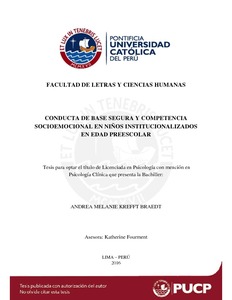Conducta de base segura y competencia socioemocional en niños institucionalizados en edad preescolar
Abstract
Como lo demuestran numerosas investigaciones, la conducta de base segura es importante para el desarrollo saludable en muchos ámbitos, entre ellos, la competencia socioemocional. Adicionalmente, varios estudios sugieren que el desarrollo del apego depende principalmente del entorno. A partir de estas consideraciones, esta investigación tuvo como propósito central describir la relación entre la conducta de base segura que establecen con sus cuidadoras y la competencia socioemocional en niños/as institucionalizados en edad preescolar. Para la recolección de datos se utilizaron dos instrumentos, el Attachment Q-Set 3.0 (AQS) y el Social Competence and Behavior Evaluation – Edición preescolar (SCBE-P), versión en español. Participaron 22 niños/as de 4 y 5 años de edad (M = 59 meses, DE = 6.20), de ellos el 72.7% ingresó a la institución por Presunto Estado de Abandono. Se encontró que la seguridad se asocia significativamente de manera inversa y mediana con las escalas Cólera/Agresión y Ansiedad/Retraimiento. Del mismo modo se halló una asociación significativa y positiva entre las escalas Placer en el contacto físico y la Competencia social, así como una asociación significativa e inversa entre las escalas Calidez en las interacciones, Placer en el contacto físico y Búsqueda de proximidad y Cólera/Agresión. Several investigations demonstrated the importance of a secure base attachment for the healthy development in many areas, as it is the social emotional competence. Furthermore, many studies suggest that the formation of secure base behavior is above all context dependent. This research described the relationship between secure base behavior with caregivers and social emotional competence in preschool institutionalized children. Two instruments were used to collect the data, the Attachment Q-Set 3.0 (AQS) and the Spanish version of the Social Competence and Behavior Evaluation – Preschool Edition (SCBE-P). The participants were 22 preschool children between 4 and 5 years (M = 59 months, SD = 6.20), the 72.7% entered the institution because of abandonment. The study found a statistically significant, medium and inverse relation between attachment security and scales Anger/Aggression and Anxiety/Withdrawal. Additionally, a statistically significant and positive correlation was found between the scales Physical contact and Social competence, as well as a statistically significant and inverse correlation between scales Smooth interactions, Physical contact and Proximity to mother and Anger/Aggression.
Temas
Conducta infantil.
Niños abandonados--Investigaciones.
Socialización en niños.
Niños abandonados--Investigaciones.
Socialización en niños.
Para optar el título de
Licenciado en Psicología Clínica






